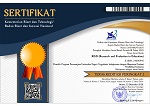Quartet cards as the media of career exploration for lower-grade primary school students
DOI:
https://doi.org/10.21831/reid.v3i2.17993Keywords:
career exploration, career quartet cards, lower-grade primary school studentsAbstract
A career developed through the optimization of one's potentials will irrevocably play a role in the development of self-identity as well as the psychological well-being of the individual. When children are introduced and allowed to explore as many career options as possible during their developmental stage, they are more likely to have a fruitful career development in the future. The preceding study showed that the career interests and knowledge of lower-grade primary students fit the Holland Career Categories: realistic, investigative, artistic, social, enterprising, and conventional (RIASEC). It was also found that the students' career interest and knowledge levels varied, with most in the low level. This second-year study aims to expand the results of the previous study by developing the use of Quartet cards as the media of career exploration for lower-grade primary students. By using the research and development method, this study develops Quartet Career Cards into three difficulty levels: low, medium, and high. The Quartet cards media have undergone feasibility tests conducted by experts in theory and media, as well as a series of field testing consisting of preliminary, main, and operational stages among a total of 266 primary students of grades 1, 2, and 3. A revision was made on several components including the images, information, colors, font sizes, illustration styles, and card sizes. The findings show that Quartet Career Cards meet the feasibility standards for the media of career explorationReferences
Ayriza, Y., Setiawati, F. A., & Triyanto, A. (2016). Career interest and knowledge of lower grade students of primary school. In International Conference of Computer, Environment, Social Science, Engineering and Technology (ICEST 2016) (p. May 23-25th). Medan, Indonesia.
Borg, W. R., & Gall, M. D. (1983). Educational research: An introduction (4th ed.). New York, NY: Longman.
Garris, R., Ahlers, R., & Driskell, J. E. (2002). Games, motivation, and learning: A research and practice model. Simulation & Gaming, 33(4), 441–467. https://doi.org/10.1177/1046878102238607
Hill, W. F. (2012). Theories of learning: Teori-teori pembelajaran, konsepsi, komparasi dan signifikansi (5th ed.). (M. Khozim, Trans.). Bandung: Nusa Media.
Holland, J. L. (1997). Making vocational choices: A theory of vocational personalities and work environments (3rd ed.). Odessa, FL: Psychological Assessment Resources. https://doi.org/10.1016/0022-4405(74)90056-9
Knight, J. L. (2015). Preparing elementary school counselors to promote career development: Recommendations for school counselor education programs. Journal of Career Development, 42(2), 75–85. https://doi.org/10.1177/0894845314533745
Magnuson, C. S., & Starr, M. F. (2000). How early is too early to begin life career planning? The importance of the elementary school years. Journal of Career Development, 27(2), 89–101. https://doi.org/10.1177/089484530002700203
Myers, J. E., Sweeney, T. J., & Witmer, M. (2000). The wheel of wellness counseling for wellness: A holistic model for treatment planning. Journal of Counseling & Development, 78(3), 251–266. https://doi.org/10.1002/j.1556-6676.2000.tb01906.x
Nauta, M. M. (2010). The development, evolution, and status of Holland's theory of vocational personalities: Reflections and future directions for counseling psychology. Journal of Counseling Psychology, 57(1), 11–22. https://doi.org/10.1037/a0018213
OECD, & Asian Development Bank. (2015). Education in Indonesia: Rising to the challenge. Paris: OECD. https://doi.org/10.1525/as.1951.20.15.01p0699q
Parker, L. E., & Lepper, M. R. (1992). Effects of fantasy contexts on children's learning and motivation: Making learning more fun. Journal of Personality and Social Psychology, 62(4), 625–633. https://doi.org/10.1037/0022-3514.62.4.625
Santrock, J. W. (2008). Educational psychology (3rd ed.). New York, NY: McGraw-Hill.
Schunk, D. H. (2012). Learning theories: An educational perspective. Upper Saddle River, NJ: Pearson/Merrill Prentice Hall.
Sigelman, C. K., & Rider, E. A. (2006). Life-span human development (5th ed.). Belmont, CA: Thomson Wadsworth.
Sweeney, T. J. (2009). Adlerian counseling and psychotherapy: A practitioner's approach (5th ed.). New York, NY: Taylor & Francis. https://doi.org/10.4324/9780203886144
Taveira, M. D. C., Silva, M. C., Rodriguez, M. L., & Maia, J. (1998). Individual characteristics and career exploration in adolescence. British Journal of Guidance & Counselling, 26(1), 89–104. https://doi.org/10.1080/03069889808253841
Xu, H., Hou, Z.-J., & Tracey, T. J. G. (2014). Relation of environmental and self-career exploration with career decision-making difficulties in Chinese students. Journal of Career Assessment, 22(4), 654–665. https://doi.org/10.1177/1069072713515628
Downloads
Published
How to Cite
Issue
Section
License
The authors submitting a manuscript to this journal agree that, if accepted for publication, copyright publishing of the submission shall be assigned to REiD (Research and Evaluation in Education). However, even though the journal asks for a copyright transfer, the authors retain (or are granted back) significant scholarly rights.
The copyright transfer agreement form can be downloaded here: [REiD Copyright Transfer Agreement Form]
The copyright form should be signed originally and sent to the Editorial Office through email to reid.ppsuny@uny.ac.id

REiD (Research and Evaluation in Education) by http://journal.uny.ac.id/index.php/reid is licensed under a Creative Commons Attribution-ShareAlike 4.0 International License.






.png)





